- News
- Reviews
- Bikes
- Accessories
- Accessories - misc
- Computer mounts
- Bags
- Bar ends
- Bike bags & cases
- Bottle cages
- Bottles
- Cameras
- Car racks
- Child seats
- Computers
- Glasses
- GPS units
- Helmets
- Lights - front
- Lights - rear
- Lights - sets
- Locks
- Mirrors
- Mudguards
- Racks
- Pumps & CO2 inflators
- Puncture kits
- Reflectives
- Smart watches
- Stands and racks
- Trailers
- Clothing
- Components
- Bar tape & grips
- Bottom brackets
- Brake & gear cables
- Brake & STI levers
- Brake pads & spares
- Brakes
- Cassettes & freewheels
- Chains
- Chainsets & chainrings
- Derailleurs - front
- Derailleurs - rear
- Forks
- Gear levers & shifters
- Groupsets
- Handlebars & extensions
- Headsets
- Hubs
- Inner tubes
- Pedals
- Quick releases & skewers
- Saddles
- Seatposts
- Stems
- Wheels
- Tyres
- Health, fitness and nutrition
- Tools and workshop
- Miscellaneous
- Cross country mountain bikes
- Tubeless valves
- Buyers Guides
- Features
- Forum
- Recommends
- Podcast
review
 Merida Speeder 20D
Merida Speeder 20D£550.00
VERDICT:
Entry-level commuter/leisure bike that's both practical and enjoyable to ride
Hydraulic disc brakes
Wide spread of gears
Great value
A mishmash of components
Quite heavy
Weight:
12,040g
Contact:
At road.cc every product is thoroughly tested for as long as it takes to get a proper insight into how well it works. Our reviewers are experienced cyclists that we trust to be objective. While we strive to ensure that opinions expressed are backed up by facts, reviews are by their nature an informed opinion, not a definitive verdict. We don't intentionally try to break anything (except locks) but we do try to look for weak points in any design. The overall score is not just an average of the other scores: it reflects both a product's function and value – with value determined by how a product compares with items of similar spec, quality, and price.
What the road.cc scores meanGood scores are more common than bad, because fortunately good products are more common than bad.
- Exceptional
- Excellent
- Very Good
- Good
- Quite good
- Average
- Not so good
- Poor
- Bad
- Appalling
Merida's Speeder 20D is a capable flat-barred road bike that provides a dependable performance if you're commuting or nipping around town, and it's a lot of fun when you head out into the lanes at the weekend. Yes, it's a little heavy but you get hydraulic disc brakes, a wide spread of gears at your fingertips, and plenty of practicality courtesy of mudguard and rack mounts. For this kind of money, it's a very good buy.
If you're looking to beat the traffic by cycling to work, check out our guide to the best commuter bikes.
Merida Speeder 20D: Ride
Practical. That might be the best word to sum up the Merida Speeder 20D. Practical and sensible, if you want a little more detail. That's not a euphemism for boring, because this bike certainly isn't that, but it does the job it's intended to do in a very workmanlike manner.
The job it's intended to do? Merida describes the Speeder 20D as an 'ideal everyday commuting or leisure bike' and that just about covers it. I've been using it for heading to the office – a few miles of out-in-the-sticks B-roads, a bit of A-road action, and an urban bunfight to finish – as well as scooting around town, and also just for fun countryside rides in the evenings and at the weekend, and this bike has been impressive throughout.
You ride in an upright and confident position here. I've been on the large-sized model with a 215mm head tube and a headset cover that adds another 15mm, so you sit pretty tall in the saddle. When you're commuting or leisure riding, you don't particularly care that you're taking a lot of air on your upper body because the position gives you plenty of comfort, vision, and control.
Weighing in at over 12kg, the Speeder 20D isn't particularly quick off the mark, but that's really not what this bike is about. It needs a bit of coaxing up to speed but doesn't feel like a big ol' lump either.
More relevant, you get a wide range of gears to cope with just about any situation that's likely to come your way. The Speeder 20D is equipped with a triple chainset from Shimano, the chainrings coming with 48, 38 and 28 teeth. Triples can be a bit of a faff – some people just can't get on with them – and most brands prefer to offer a double or even a 1x system, but they give you more gear options when an 8-speed cassette is fitted, in this case an 11-32T.
If you work in gear inches, the smallest gear (when the chain is on the 28-tooth chainring and 32-tooth sprocket) is 23.6in. If that doesn't mean a whole lot to you, the lowest gear that you get with a compact chainset (with 50/34T chainrings) and a cassette that goes up to 34T, is 27in.
In other words, the Speeder's easiest gear is small for a bike designed for the road (although not as small as the 26x34 on the Merida Crossway 300 hybrid that John Stevenson reviewed earlier in the year). If you live anywhere remotely flat, you probably won't use that ratio often, but it's there to bail you out of trouble if you find yourself tackling steep slopes and/or you load the bike up with a rack and bags. Bath, where road.cc is based, has a load of big hills, some of them steep, and the Speeder is perfectly capable of tackling the lot (as long as you have a reasonable level of fitness, of course). Granted, you're not always going fast – pedal at 90rpm and you'll be doing just over 6mph in that smallest gear – but it'll keep you moving.
The fact that the bike is equipped with just an 8-speed cassette rather than anything more means there are sometimes fairly sizeable jumps as you shift at the back. This can knock you out of your rhythm, but with a gear range of nearly 500%, you'll always find a ratio that's there or thereabouts (read more about bike gears here).
Up at the top end of the gear range, the 48x11 allows you to keep pedalling on most descents. It'll take you up to 31.5mph at 90rpm, for example. This isn't the sort of bike where you can get down into a tucked position to cut through the wind, so if you want to go any faster than that you'll have to spin for all you're worth.
The Speeder actually descends very well. You can't chuck it into tight turns like a drop-barred road bike but you can tackle sweeping bends confidently and feel fully in control. The Kenda Kwik Roller Sport tyres are a low-rent option – they're a bit cheap and cheerful, to be honest – but they're not so lacking in grip that they'll dump you on your arse if you take a damp corner fast, while the Power DS-100HT hydraulic disc brakes have the power to scrub off speed quickly if anything unexpected comes your way.
Those brakes provide loads of control in traffic too. You can accelerate hard, safe in the knowledge that you'll be able to slow down again if the car in front suddenly stops or the lights change. They just work well so you don't have to ride as if they might not bite.
As for the comfort, I didn't give it much thought during several weeks of riding the Speeder, and that's always a good sign. As mentioned, the riding position is pretty upright so you're unlikely to get aches in your back or neck, and while the padding on Merida's own saddle is a touch too squishy for my taste, it's not too crazy. Of course, it might work perfectly for you. Saddles are like that. There's certainly enough flex in the shell to take the edge off potholes and bumps in the road, and I like Merida's grippy grips too – they're not too bulky and feel almost tacky to the touch. Some people might prefer more cushioning but there's never any danger of your hands slipping.
The Kenda Kwik Roller Sport tyres come in a 32mm width and so they put a decent amount of air between you and the road. Even though there's loads of space between the front tyre and the fork, things are a little tighter at the back and Merida says that 32mm is as wide as you can go. That means you need to stick to tarmac here, with maybe the occasional excursion onto a towpath or something similar, but muddy tracks are out. If you want more choice in the type of surfaces you ride, check out Merida's Crossway range.
Merida Speeder 20D: Frame and fork
The Merida Speeder 20D is built around a 6061 aluminium frame with welds that look like they'll outlast the lot of us.
With fully external cable routing, a rear brake calliper positioned outside the rear triangle, and quick-release skewers rather than thru-axles, it looks a little old fashioned – but this is a 550 quid bike, don't forget. Plus, those QRs do make getting a wheel on and off very simple if you puncture, and external cabling can make maintenance easier too, so there are certainly benefits.
The fork that slots in up front is a steel affair and it's pretty weighty but, like the frame, it comes with mounts for fitting a mudguard, and that makes a lot of sense on a bike of this kind.
You also get threaded rack mounts that'll make life easier if you want to lug stuff to and from work and don't fancy sticking it all in a backpack, along with two sets of bosses for bottle cages.
Unlike the rest of the Speeder range, the 20D is available in four sizes rather than six. How come? This is a UK-specific frame and model, and it allows the price to be kept as low as possible. Even so, with seat tubes ranging in length from 470mm to 590mm, most people should find a size to suit.
Merida Speeder 20D: Components
The Speeder 20D's components are a real mix 'n' match. I've already mentioned the Shimano TY301 triple chainset, which is from the 'lifestyle' Tourney groupset. The front derailleur is Tourney too, while the rear is Acera, and the cassette and chain are from Sunrace.
The two-piston hydraulic disc brakes are Power DS-100HT, and the shifters? They're from Microshift. A real mishmash, then, but it all works together really well.
The gears shift obediently at both the front and rear via easily operated thumb levers, and one-fingered braking brings you smoothly to a stop. You get reach adjustment on the brakes via a little hex screw that sits inside the lever and, like Shimano's, they use mineral oil.
The wheels are made up of Merida's own Comp TK aluminium rims, TX505 hubs from Shimano's Tourney range, and 36 spokes front and rear. The hubs use Shimano's cup and cone bearings and should last an age if you treat them nicely. It's all reliable stuff.
The Kenda Kwik Roller Sport tyres aren't the lightest or grippiest ever, but they're hardwearing. They're good enough to be going on with but I'd be upgrading them when they wear out.
As you'd probably expect, the stem, handlebar and seatpost are all aluminium and Merida branded. Following the recurring theme of this bike, they do the job just fine without shouting too loudly about it.
The VP VP-891 pedals, on the other hand, are plastic and horrible, as they are on most complete bikes. Ditch them.
Merida Speeder 20D: What you don’t get
Merida doesn't provide you with mudguards or lights, both of which would be useful on a bike that's likely to be used for commuting. You can understand why. Not offering them keeps the price down and users might have preferences already. As mentioned, though, this is a UK-specific model and we all know about the weather we get here. Mudguards, at least, would be a handy addition.
Merida Speeder 20D: Value
The Merida Speeder 20D is among the cheaper bikes we've reviewed lately.
John Stevenson really liked the Carrera Subway All Weather Edition Men's Hybrid Bike that we reviewed last year. It has gone up from £450 to £485 since then, but it still offers exceptional value as a fully loaded commuter bike, complete with hydraulic disc brakes, mudguards and even heated grips. It's certainly not the be-all and end-all – far from it – but the Merida is considerably lighter (12.04kg rather than 14.74kg).
Matt Lamy was impressed by the Vitus Mach 3 VR when he reviewed it on road.cc a couple of years ago, finding it to be fast, smooth rolling, and stable. That bike has had spec changes since then, though, including a move to a 1x drivetrain, and the price has increased from £579.99 to £699.99.
Looking at the market as a whole, the Merida Speeder 20D offers very good value. It's a bit of a cliché, but you get a lot of bike for your money here.
Who should buy the Merida Speeder 20D?
With the addition of a few extras – mudguards, lights, maybe a rack and a lock – the Speeder 20D makes a very good commuting bike, especially if your commute is largely in town. Out on open roads, the Speeder isn't as quick as a drop-barred bike, but the upright riding position, hydraulic disc brakes, and a range of gears wide enough to cover most situations make it a great option for urban streets.
Beyond that, though, the Speeder 20D is an enjoyable bike to go out and ride. Some entry-level bikes get you from A to B and that's about it; there are compromises here, there and everywhere that detract from the overall experience.
With this bike, though, you just head off into the lanes for a couple of hours and don't find yourself thinking, 'This would be good if only I had a couple of smaller gears, if only the brakes had a bit more oomph, if only the saddle wasn't so damn uncomfortable...' or whatever.
Don't get me wrong, the Speeder 20D is clearly a budget bike in many ways – there's that steel fork and the fact that the groupset components are a real motley collection – but it's a lot of fun. It allows you to go out and enjoy yourself, focusing on the ride rather than on any shortcomings of the spec sheet.
Verdict
Entry-level commuter/leisure bike that's both practical and enjoyable to ride
road.cc test report
Make and model: Merida Speeder 20D
Size tested: Large
About the bike
List the components used to build up the bike.
FRAME Speeder Speed
FORK Speeder Rigid Steel
RIM Merida Comp TK
HUBS Shimano TX505
FRONT TYRE Kenda K1029 700 x 32
REAR TYRE Kenda K1029 700 x 32
CHAINWHEEL Shimano TY301 (48/38/28)
BOTTOM BRACKET FSA TH-7420ST-W, cartridge bearing
CASSETTE Sunrace CSM668 (11-32)
CHAIN Sunrace M84
SHIFTERS Microshift
FRONT DERAILLEUR Shimano FD-TY710
REAR DERAILLEUR Shimano RD-M360
BRAKEs Power DS-100HT; 2 piston hydraulic disc brake calliper
ROTORS Shimano RT10 160mm
HEADSET FSA NO.10P
STEM MERIDA Speed
HANDLEBAR MERIDA CC
GRIP MERIDA EC
SEAT POST MERIDA CC
SADDLE MERIDA D1-072
PEDAL VP, VPE-891
Tell us what the bike is for and who it's aimed at. What do the manufacturers say about it? How does that compare to your own feelings about the bike?
Merida says: "An everyday commuting or leisure bike with 24 speed Shimano gears.
"No corners cut, the specification includes a Shimano chainset, Shimano hubs and hydraulic disc brakes."
That's about right. This bike is suitable for commutes, rides around town, leisure rides in the country. You can use it for fitness rides if you like, it just won't be as quick as a drop-barred road bike. The wide spread of gears means it can handle hills well.
Where does this model sit in the range? Tell us briefly about the cheaper options and the more expensive options
This is the cheapest of Merida's Speeder models by quite a margin. The next model up is the Speeder 100 at £750. This has a lighter frame, a carbon fibre fork and Shimano MT200 hydraulic disc brakes.
The Speeder 20D is a UK-specific frame and model.
Frame and fork
Overall rating for frame and fork
8/10
Tell us about the build quality and finish of the frame and fork?
It's solid throughout.
Tell us about the materials used in the frame and fork?
The frame is 6061 aluminium and the fork is steel.
Tell us about the geometry of the frame and fork?
I was riding the large-sized Speeder 20D with a 560mm seat tube, 565mm top tube, and 215mm head tube. The frame angles are both 73° and the wheelbase is 1,017mm.
How was the bike in terms of height and reach? How did it compare to other bikes of the same stated size?
The stack height is 635mm and the reach is 371mm, giving a stack/reach of 1.71. This suggests a very upright riding position... and it is.
Riding the bike
Was the bike comfortable to ride? Tell us how you felt about the ride quality.
Yeah, the 32mm tyres provide comfort and there's plenty of flex in the shell of the saddle. If you want more cushioned grips, they're a cheap and easy swap.
Was there any toe-clip overlap with the front wheel? If so was it a problem?
The tiniest amount. The lack of marks on my white shoes says it hasn't been an issue, not even in stop-start traffic.
How would you describe the steering? Was it lively neutral or unresponsive? Middling.
Tell us some more about the handling. How did the bike feel overall? Did it do particular things well or badly?
This isn't the sort of bike you're likely to be chucking into corners as fast as you dare. You sit very high and upright, but it has very good manners in all situations.
Which components had the most effect (good or bad) on the bike's comfort? would you recommend any changes?
The saddle is a bit more squishy and deeply cushioned than I would pick myself, but it's not nearly as big and sofa-like as you find on many entry-level models.
The grips are grippier than they are soft. I like that, but some people prefer more depth.
Rate the bike for efficiency of power transfer:
8/10
Rate the bike for acceleration:
6/10
Rate the bike for sprinting:
8/10
It's not what this bike about at all, but the frame is certainly stiff enough.
Rate the bike for high speed stability:
8/10
Rate the bike for cruising speed stability:
8/10
Rate the bike for low speed stability:
8/10
Rate the bike for flat cornering:
8/10
Rate the bike for cornering on descents:
8/10
Rate the bike for climbing:
6/10
It's not light but it's not heavy for the price either. The gear range will cope with most hills you'll encounter on the road.
The drivetrain
Rate the drivetrain for performance:
8/10
Rate the drivetrain for durability:
8/10
Rate the drivetrain for weight:
6/10
Rate the drivetrain for value:
8/10
Tell us some more about the drivetrain. Anything you particularly did or didn't like? Any components which didn't work well together?
It's a bit of a mishmash of components but it all works together fine. Some people won't like the fact that it's a triple chainset – a bit dated and a faff to use – but it does the job.
Wheels and tyres
Rate the wheels for performance:
8/10
Rate the wheels for durability:
9/10
Rate the wheels for weight:
7/10
Rate the wheels for comfort:
7/10
Rate the wheels for value:
9/10
Tell us some more about the wheels.Did they work well in the conditions you encountered? Would you change the wheels? If so what for?
The wheels use Shimano hubs and 32 spokes front and rear. They're well tensioned and built for durability more than anything else.
Rate the tyres for performance:
5/10
Rate the tyres for durability:
8/10
Rate the tyres for weight:
5/10
Rate the tyres for comfort:
6/10
Rate the tyres for value:
7/10
Tell us some more about the tyres. Did they work well in the conditions you encountered? Would you change the tyres? If so what for?
They're not the grippiest compound ever, but they're pretty hardwearing. I didn't have any dicey moments with them. I'd be swapping them when they wear out.
Controls
Rate the controls for performance:
8/10
Rate the controls for durability:
9/10
Rate the controls for weight:
8/10
Rate the controls for comfort:
9/10
Rate the controls for value:
8/10
Tell us some more about the controls. Any particularly good or bad components? How would the controls work for larger or smaller riders?
The thumb-tap shifters from Microshift work well enough and each has a little gear indicator on the top (although I never managed to get into the habit of using them).
You can dial the reach of the Power brake levers right in with a 2mm hex key for smaller hands.
Your summary
Did you enjoy riding the bike? Yes
Would you consider buying the bike? If I was after a bike in this price bracket, I'd certainly consider it.
Would you recommend the bike to a friend? Yes
How does the price compare to that of similar bikes in the market, including ones recently tested on road.cc?
John Stevenson really liked the Carrera Subway All Weather Edition Men's Hybrid Bike that we reviewed last year. It has gone up from £450 to £485 since then, but it still offers exceptional value as a fully loaded commuter bike, complete with hydraulic disc brakes, mudguards and even heated grips. It's certainly not the be-all and end-all – far from it – but the Merida is considerably lighter (12.04kg rather than 14.74kg).
Matt Lamy was impressed by the Vitus Mach 3 VR when he reviewed it on road.cc a couple of years ago, finding it to be fast, smooth rolling, and stable. That bike has had spec changes since then, though, including a move to a 1x drivetrain, and the price has increased from £579.99 to £699.99.
Rate the bike overall for performance:
8/10
Rate the bike overall for value:
8/10
Use this box to explain your overall score
The Merida Speeder 20D puts in a very good performance at a very good price. To me, it's a clear 8 overall.
About the tester
Age: 48
I usually ride: My best bike is:
I've been riding for: Over 20 years I ride: Most days I would class myself as: Expert
I regularly do the following types of riding: commuting, club rides, sportives, general fitness riding,
Mat has been in cycling media since 1996, on titles including BikeRadar, Total Bike, Total Mountain Bike, What Mountain Bike and Mountain Biking UK, and he has been editor of 220 Triathlon and Cycling Plus. Mat has been road.cc technical editor for over a decade, testing bikes, fettling the latest kit, and trying out the most up-to-the-minute clothing. He has won his category in Ironman UK 70.3 and finished on the podium in both marathons he has run. Mat is a Cambridge graduate who did a post-grad in magazine journalism, and he is a winner of the Cycling Media Award for Specialist Online Writer. Now over 50, he's riding road and gravel bikes most days for fun and fitness rather than training for competitions.
Latest Comments
- Rendel Harris 12 min 4 sec ago
I haven't been to Mallorca since I was a child, a long way back in the last century, and I'm sure there are plenty of downsides to the tourism...
- wtjs 33 min 49 sec ago
I see that what I should have written is that good quality outers are necessary - the split ones were the originals on a bike which only cost £650...
- OnYerBike 2 hours 38 min ago
I've no idea what the situation is here, but I've seen plenty of "under construction" cycle lanes where there are only signs/barriers around the...
- the little onion 2 hours 45 min ago
whereas the whole point is that they didn't hit you this time
- Tom_77 2 hours 59 min ago
AIUI an entering-circulating accident [sic] would be when the vehicle entering the roundabout fails to give way to the vehicle circulating.
- chrisonabike 3 hours 17 min ago
Which is great - but you can only take a bus which exists eg. is going somewhere near where you want to go, when you want to go....
- mdavidford 5 hours 9 min ago
Erm, does someone need counting lessons?
- Willem1 5 hours 21 min ago
My cannondale SuperSix gen3 frameset i recently bougth has a sticker saying: made in China. Dont know about the newest models.
- SimoninSpalding 6 hours 4 min ago
Cos style, and did you not read it only weighs 158g!...
- chrisonabike 6 hours 30 min ago
It's strange - some folks who grew up there say it was a great community and has declined. Some folks say it was "like Beiruit" and has calmed down...
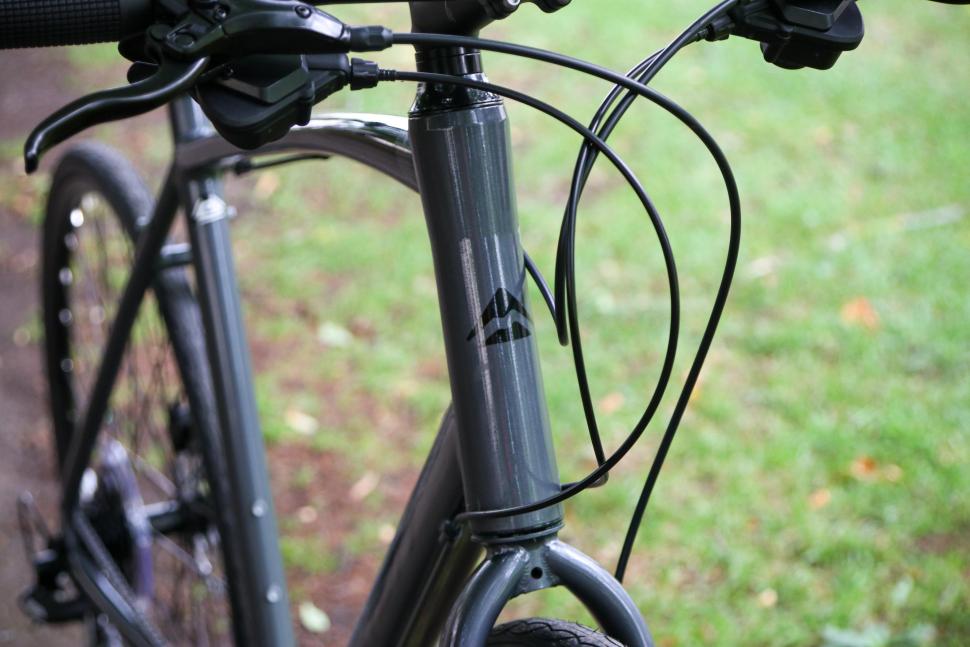
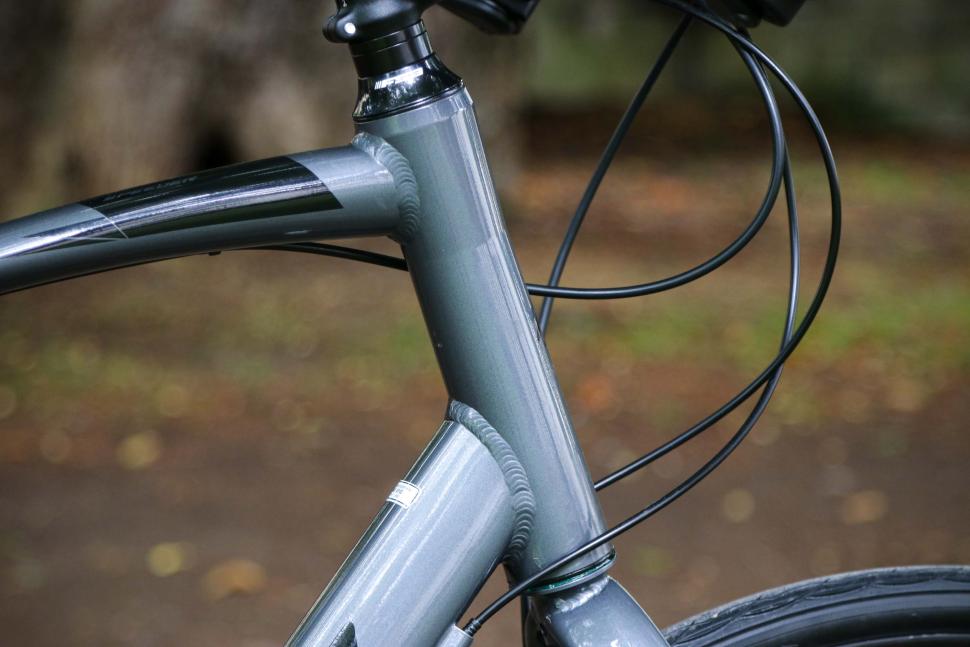































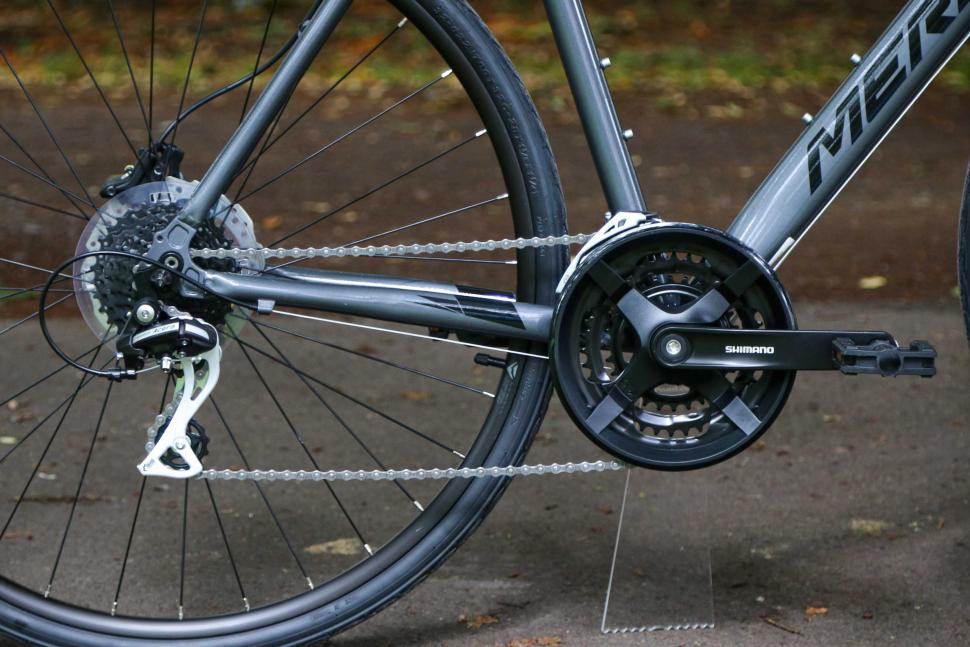
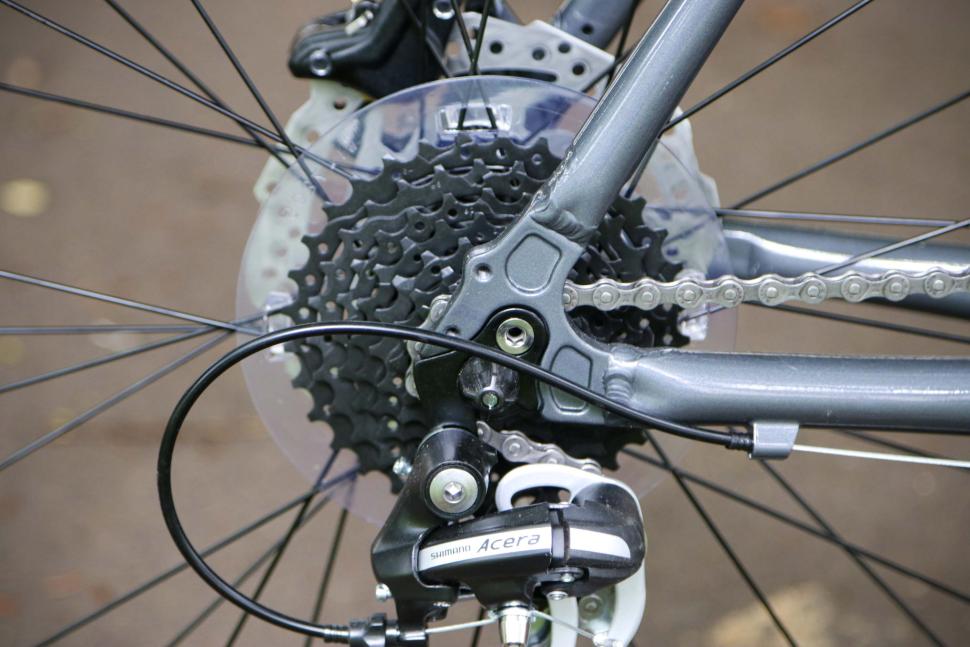
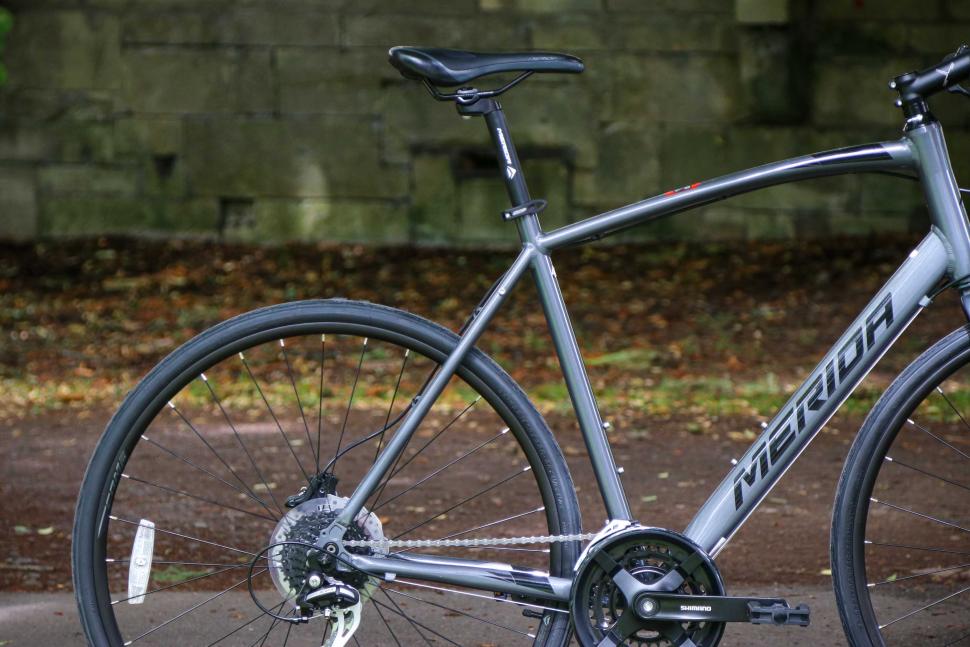
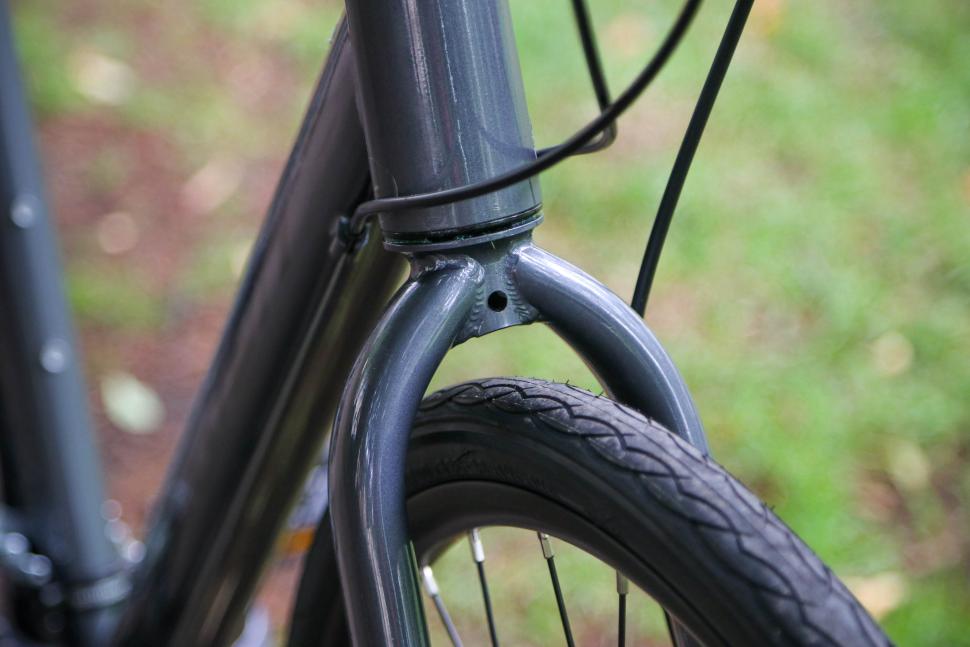
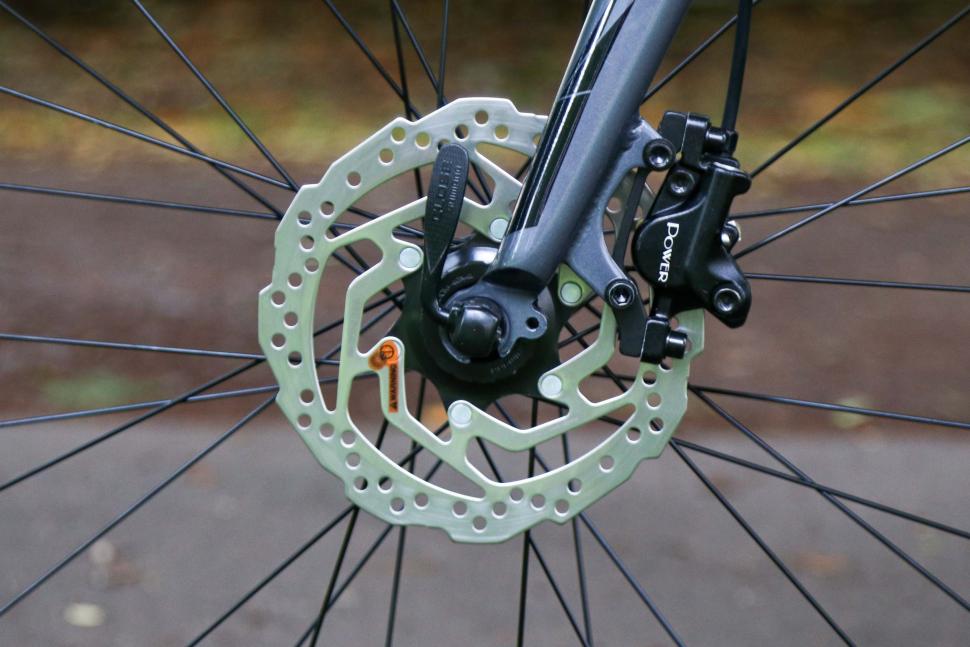
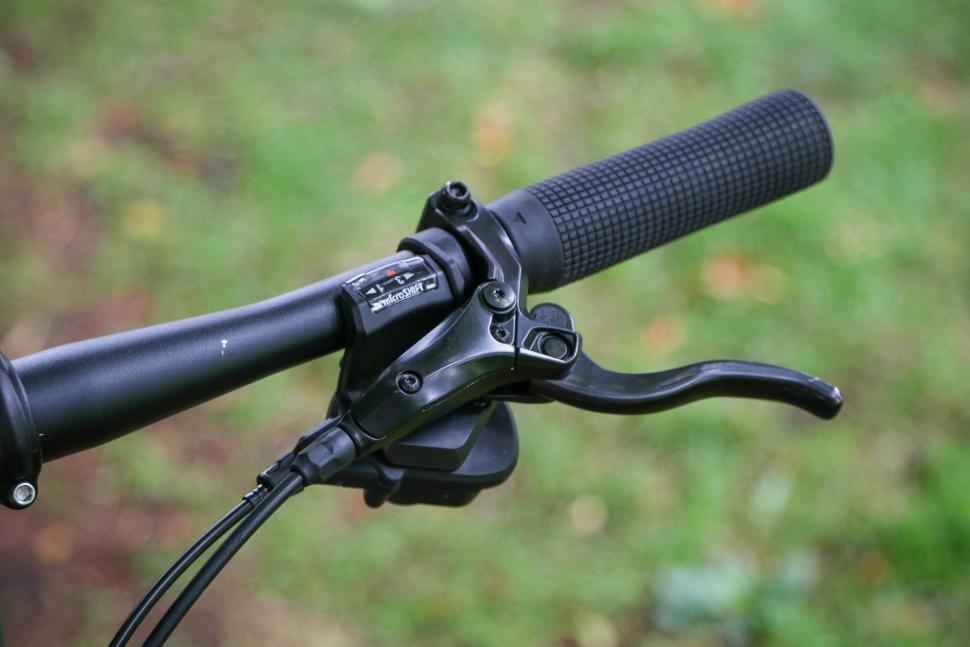
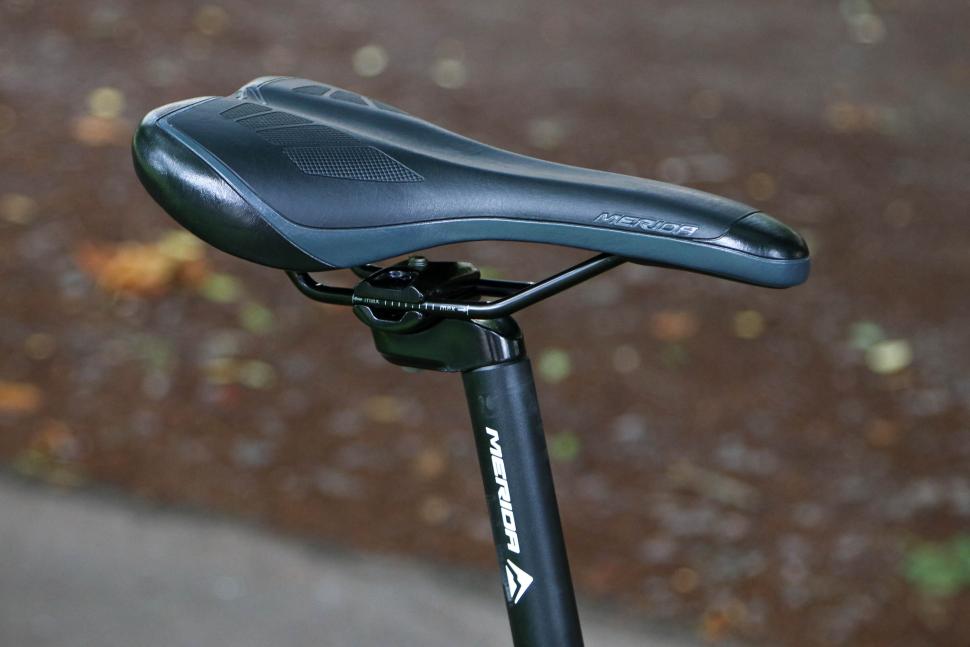

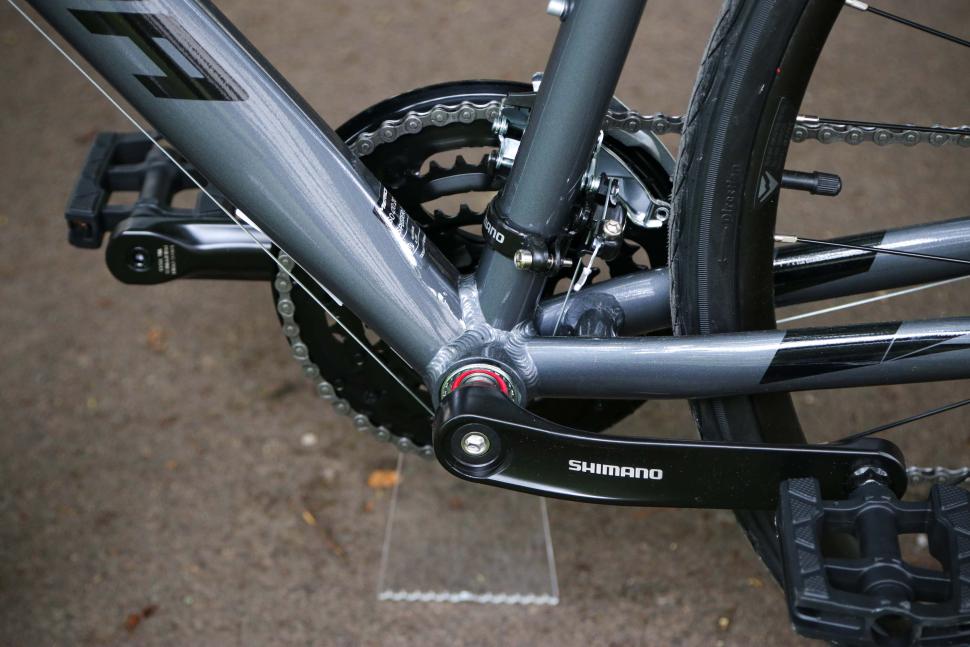
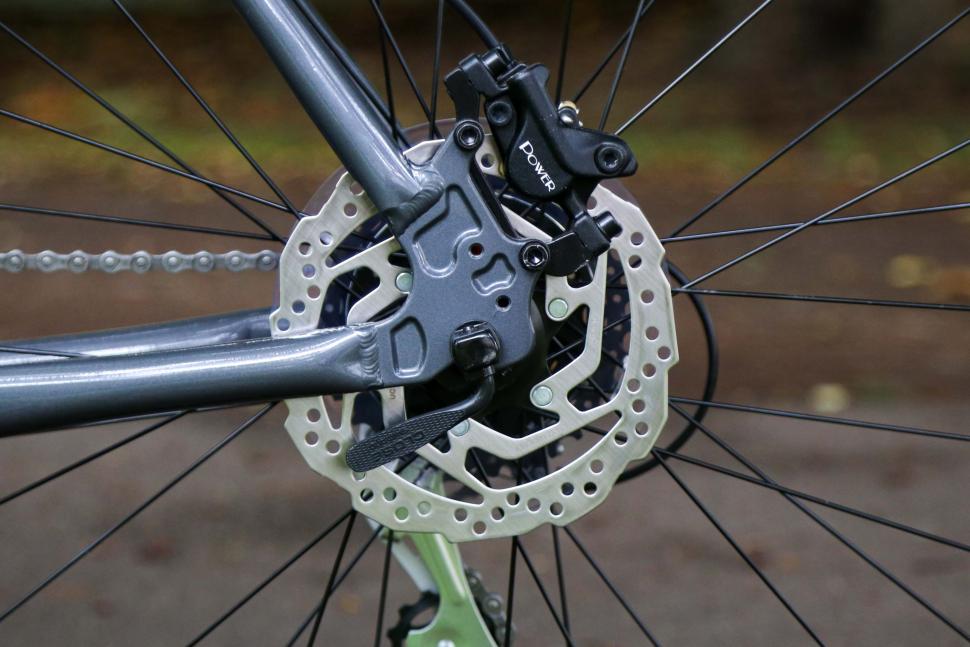

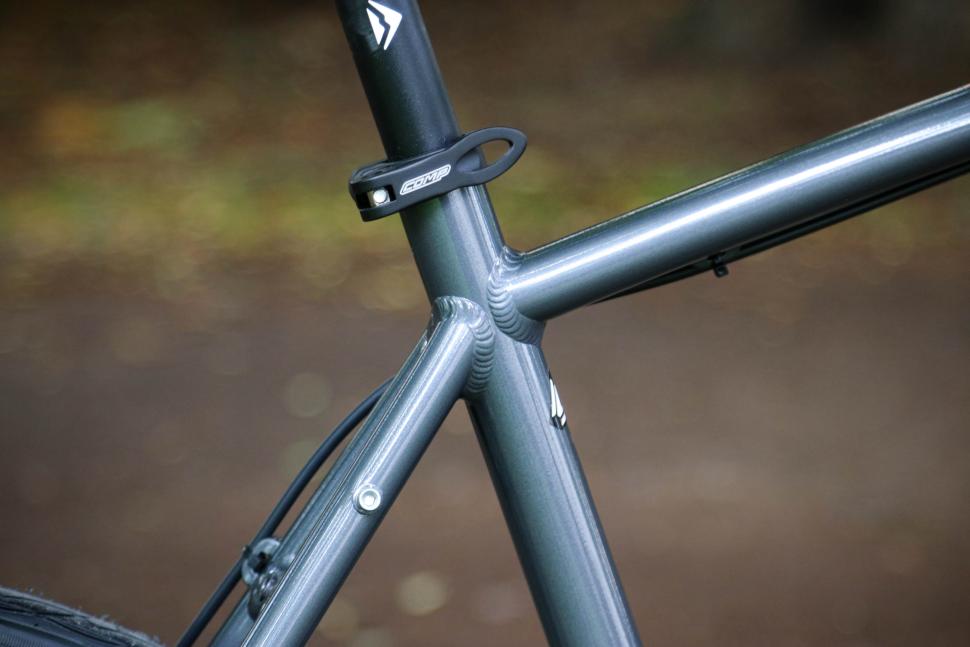

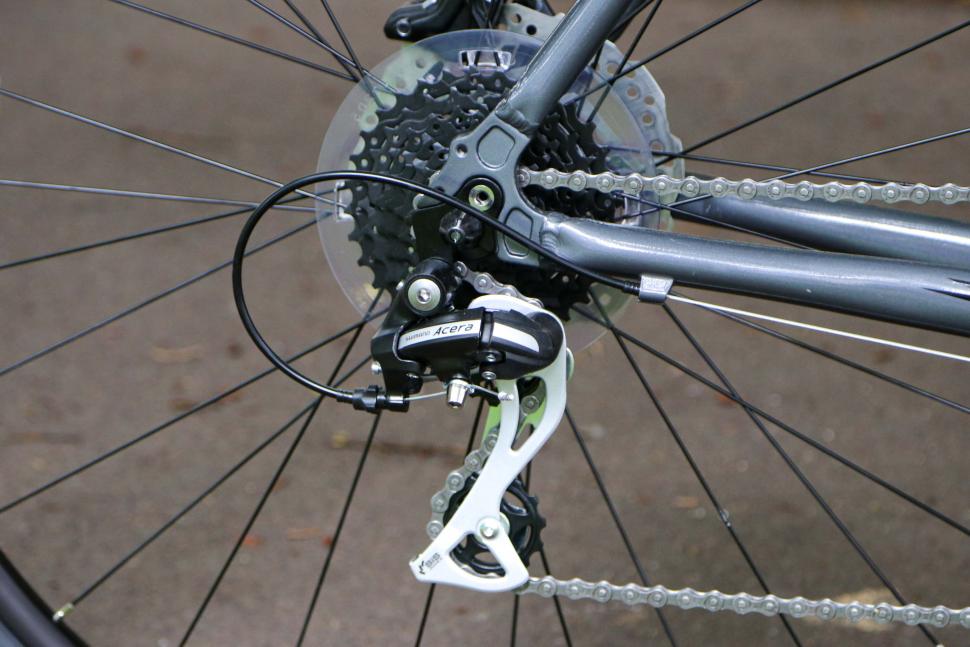
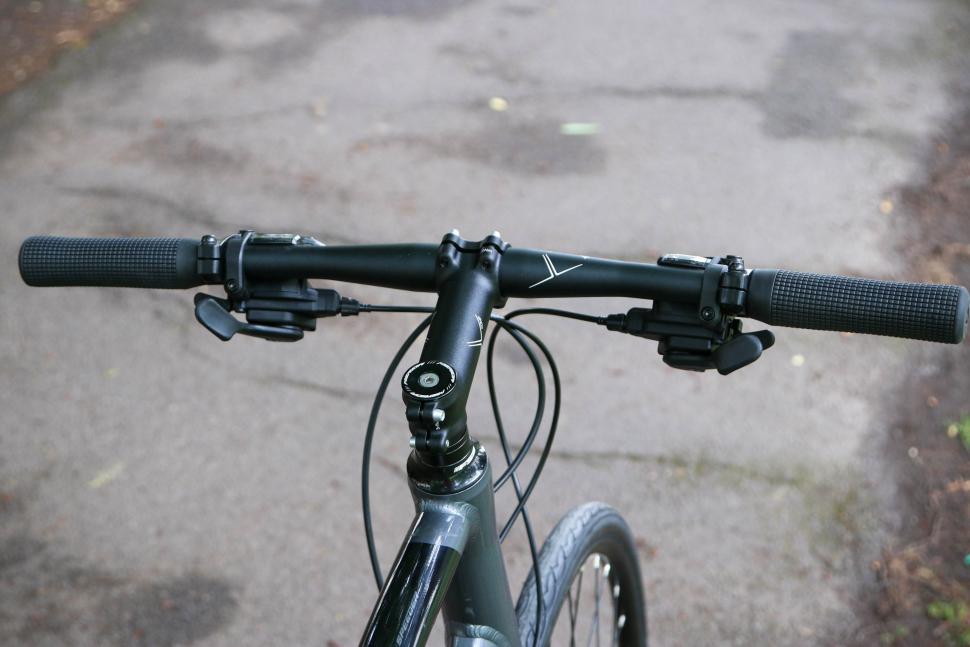
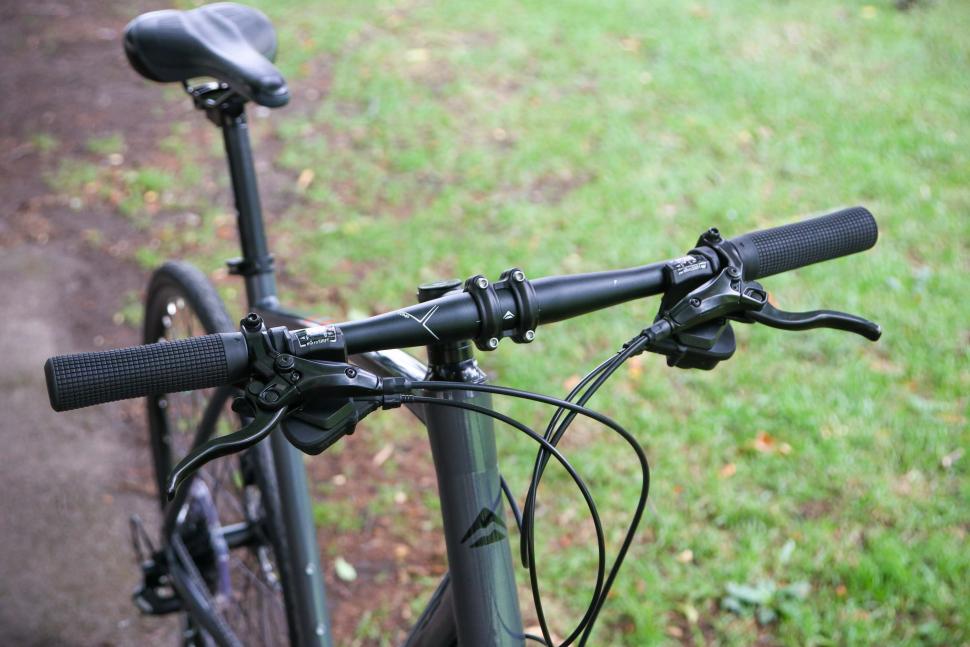
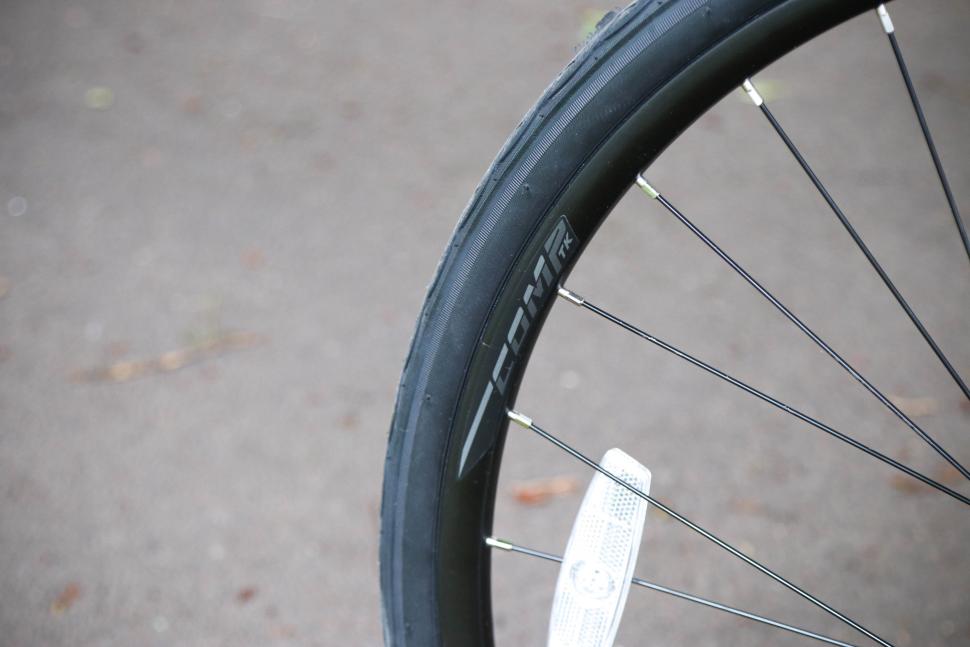
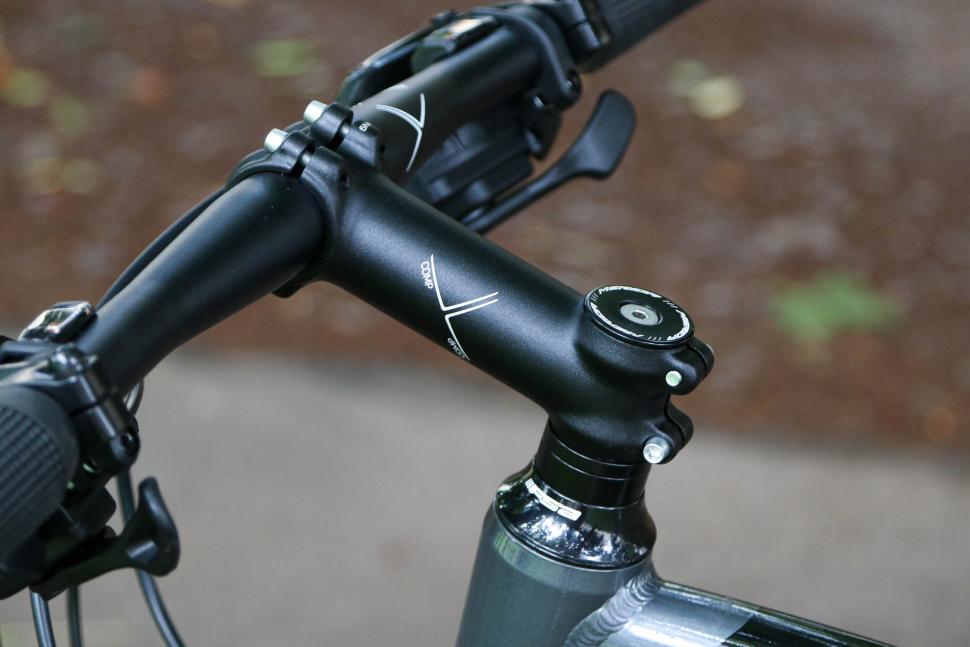

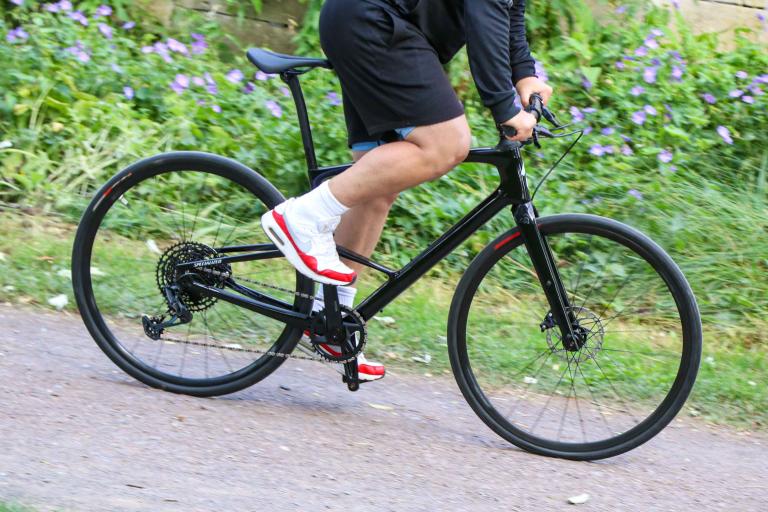
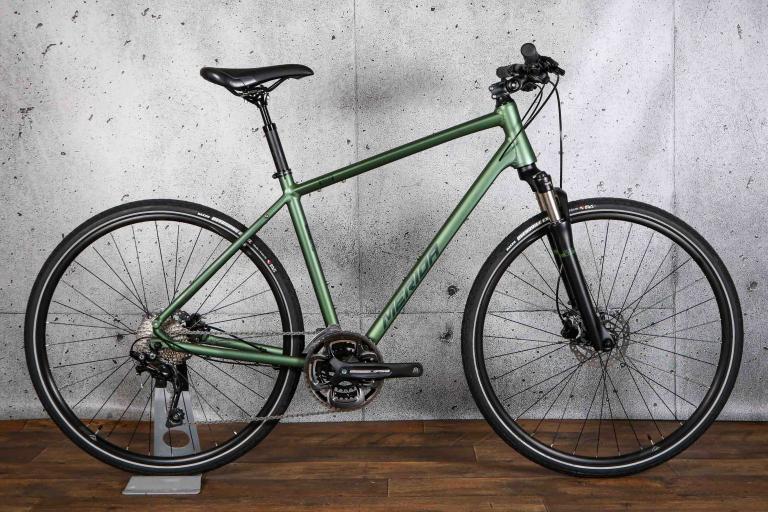
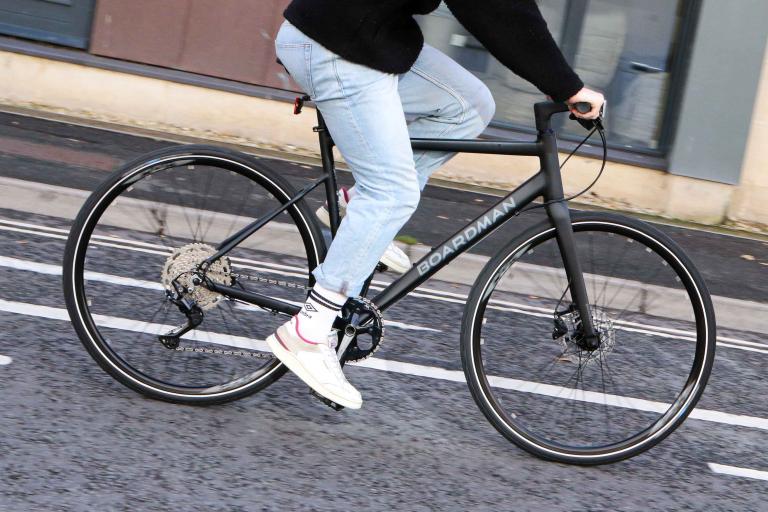
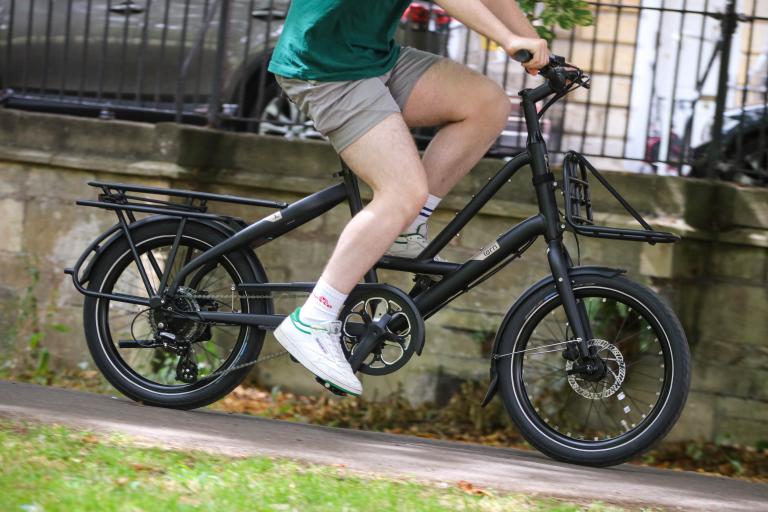
Add new comment
4 comments
Looks like all the bike most people would ever need. Hydraulic brakes seem a bonus. A 1x option would work even better for most though - simpler, lighter and not much (any?) extra cost.
I would have thought that (because Shimano are phasing out these component tiers) we would have started seeing their CUES system on these genre of bikes by now. The parts are all available aftermarket and use their Linkglide. This does mean that you would need chain and cassette to match. But CUES goes from 1 and 2x9 to 11 speed.
With fewer gears on the back, 1x would be extremely limiting so having more up front allows for both a wide range overall and reasonably sized jumps between gears on the rear. Unless you live anywhere particularly flat an 8 or 9 speed 1x system will be seriusly compromised on at least one of those points.
The bike looks to be very much upgradeable though so a 10 or 11sp 1 or 2x wouldn't need too much work or extra parts outside the groupset. It would save a little weight too.
With a good quality frame, and the right geometry (which judging by the review this bike absolutely has) upgrades like that can be justified when the drivetrain wears out because it has such good foundations. Apart from tyres, the biggest source of ride quality comes from the frame.
I'm not in the market for a hybrid/urban bike right now but if I was this would absolutely meet most if not all the criteria I would need from a cheap workhorse - I would definitely want to see/test one for certain. The hydro brakes are definitely a welcome surprise at this price point too. That makes this an extremely impressive build for the money.
You might want a 1x10 to address range and jumps (without going to 11+spd expense). That current bottom gear (28x32) is the equivalent of a 42x46 - 46t isn't unusual on a 1x set-ups (and it's lower than old-time MTBs, so I might prefer a slightly higher bottom gear and smaller gaps). Still not as fine-tunable as a triple - but I suspect many people using these bikes will neither understand, bother with, or need that level of adjustability.
.
Excellent review, Mat. Many thanks.
.